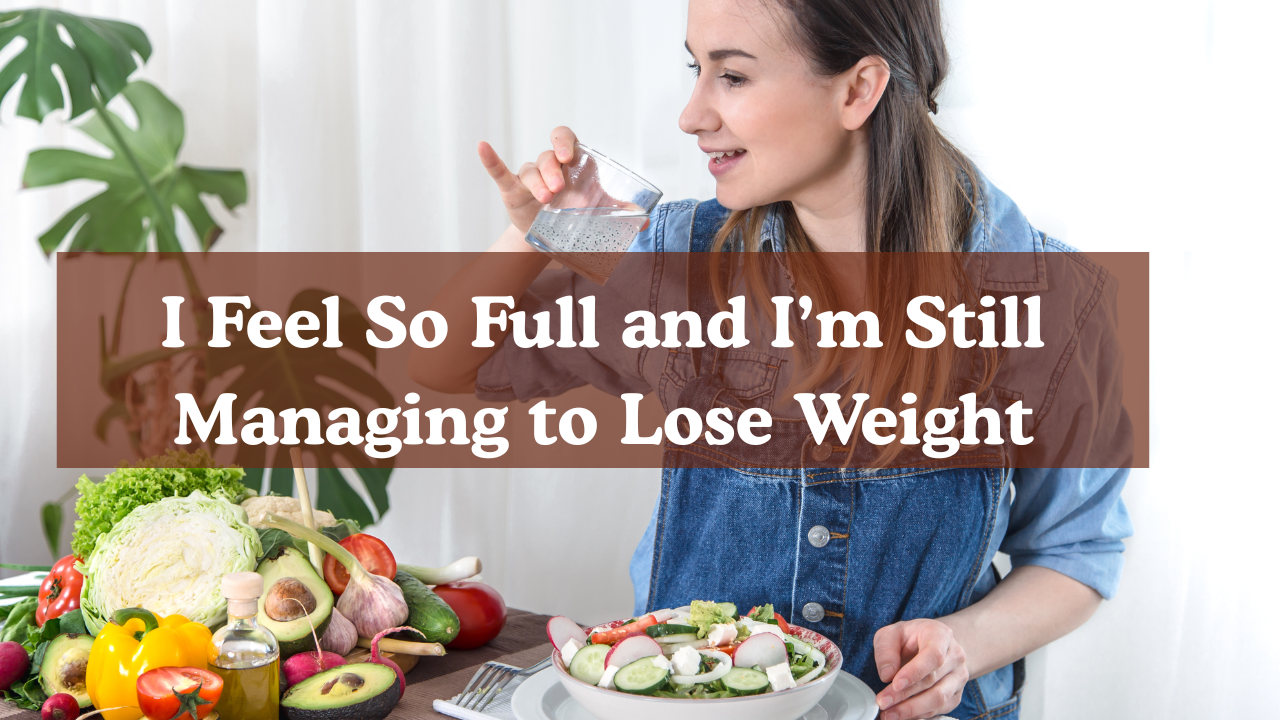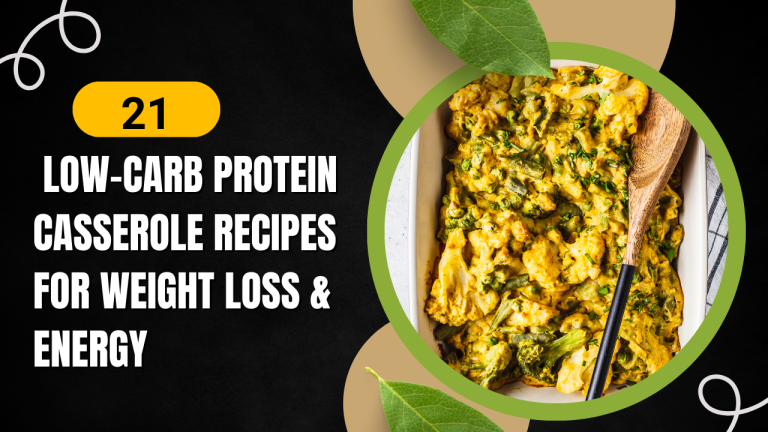I Feel So Full and I’m Still Managing to Lose Weight
Have you ever caught yourself thinking, “I’m eating more than I used to, yet the scale keeps dropping?
It sounds too good to be true—but it’s possible. Feeling full while still losing weight isn’t a fantasy diet trick; it’s what happens when you learn how to fuel your body efficiently with the right foods, nutrient balance, and metabolic strategies that work with your body instead of against it.
In this guide, we’ll break down how you can eat more, feel satisfied, and continue to lose weight naturally—without starving, skipping meals, or obsessing over calories.
Understanding Why Feeling Full Doesn’t Mean Weight Gain
Most people associate “feeling full” with overeating or gaining weight, but fullness actually signals that your body is satisfied with nutrients—not just calories.
When you eat nutrient-dense, fiber-rich, and high-protein foods, your body sends signals to your brain to reduce hunger hormones (like ghrelin) and increase satiety hormones (like leptin and peptide YY).
This means you can feel completely satisfied and still be in a calorie deficit—the ultimate formula for healthy, sustainable fat loss.

Why You Feel Full But Are Still Losing Weight
Here are the main reasons why you might feel full and yet continue shedding pounds:
1. You’re Eating High-Protein Meals
Protein is the most satiating macronutrient. It not only keeps you full longer but also boosts your metabolism by up to 30% more calories burned during digestion.
Try this: Add eggs, chicken breast, Greek yogurt, cottage cheese, or lentils to your meals for maximum fullness and fat burn.
2. You’ve Increased Fiber Intake
Fiber-rich foods expand in your stomach and slow digestion. They keep you feeling fuller while reducing the urge to snack.
Think of vegetables, chia seeds, berries, and whole grains as your natural appetite controllers.
3. You’re Eating Whole, Unprocessed Foods
Whole foods like fruits, vegetables, lean proteins, and healthy fats are nutrient-dense but naturally lower in calories.
You can eat large volumes without going overboard on energy intake—so your stomach feels satisfied, and fat loss continues.
4. Your Blood Sugar Levels Are Stable
When your meals contain balanced portions of protein, fiber, and healthy fats, your blood sugar remains stable—reducing hunger spikes and cravings.
This stability helps your body burn stored fat for energy, especially between meals.
5. You’re Hydrated
Sometimes “hunger” is actually thirst. When you stay well-hydrated, digestion improves, metabolism runs efficiently, and you feel full longer.
Drinking enough water also boosts calorie burn by up to 30% for 1 hour after drinking.

Foods That Make You Feel Full and Still Lose Weight
Here’s a list of smart, satisfying foods that keep you full while supporting weight loss:
Protein Powerhouses
- Chicken, turkey, salmon, tuna
- Eggs & egg whites
- Cottage cheese, Greek yogurt
- Lentils, chickpeas, tofu
High-Fiber Choices
- Leafy greens (spinach, kale, romaine)
- Broccoli, cauliflower, zucchini
- Chia seeds, flaxseeds, psyllium husk
- Oats and quinoa
Healthy Fats That Satisfy
- Avocado
- Olive oil
- Almonds, walnuts, pumpkin seeds
- Fatty fish (salmon, mackerel, sardines)
Hydrating Fruits & Veggies
- Cucumber, celery, and lettuce
- Berries, apples, and grapefruit
Pro tip: Combine protein, fiber, and healthy fats in each meal—this trio ensures long-lasting fullness and steady fat loss.

Sample “Full but Losing Weight” Meal Plan
Breakfast: Protein-Packed Start
- Greek yogurt bowl with chia seeds, almond butter, and berries
- Green tea or black coffee
Lunch: Balanced Fuel
- Grilled chicken with quinoa, roasted broccoli, and olive oil drizzle
Snack: Smart & Filling
- A handful of mixed nuts or a protein smoothie
Dinner: Light but Nourishing
- Baked salmon with asparagus and mashed cauliflower
Evening Treat:
- Herbal tea and a square of dark chocolate (80% cacao or higher)
How Feeling Full Actually Boosts Fat Loss
When you’re full and satisfied, you naturally:
- Eat fewer calories overall (no overeating or bingeing)
- Regulate hunger hormones effectively
- Maintain consistent energy levels
- Sleep better, which reduces fat-storing cortisol
The result? A healthier metabolism that supports effortless fat loss—without restriction.
Mindful Eating Habits That Support Fullness
- Eat Slowly & Chew Thoroughly
It takes 15–20 minutes for your brain to register fullness. Eating slowly helps you stop before overeating. - Focus on Food Quality
Nutrient-dense foods (not processed snacks) keep you full longer with fewer calories. - Don’t Skip Meals
Skipping meals leads to overeating later and slows metabolism. Eat balanced meals regularly. - Get Enough Sleep
Sleep deprivation increases hunger hormones—making you crave carbs and sugar. - Add Volume with Veggies
You can double your food volume by adding greens, soups, or salads without increasing calories.

The Science of Metabolism and Satiety
Your metabolism is constantly adjusting based on your food choices, activity, and sleep. When you eat well, your body burns calories efficiently, stores less fat, and uses more energy for repair and recovery.
Satiety hormones like leptin and peptide YY increase with high-protein, high-fiber diets, while ghrelin (the hunger hormone) decreases.
This creates a feedback loop of satisfaction, energy, and fat burning.
Hydration & Fullness Connection
Water plays a crucial role in digestion, nutrient absorption, and hunger control.
Try drinking a glass of water before each meal—it can reduce calorie intake by up to 13%.
Add lemon, cucumber, or mint for flavor and detox benefits.
The Role of Stress & Hormones
If you’re still eating well and feeling full, but stress levels are high, your cortisol can interfere with fat burning.
Balance stress by:
- Practicing yoga or meditation
- Walking after meals
- Prioritizing 7–8 hours of sleep
When cortisol levels drop, your body stops “holding” belly fat and starts burning it more efficiently.
Real-Life Results: How People Lose Weight While Feeling Full
Thousands of people have experienced effortless weight loss simply by focusing on whole foods, portion awareness, and hormone balance.
They often report:
More energy
No cravings
Better digestion
Stable moods
Sustainable fat loss
This is not a “diet”—it’s a long-term lifestyle of smart eating and mindful nourishment.
Final Thoughts: Feeling Full Is the New Secret to Fat Loss
Losing weight doesn’t have to mean constant hunger or restrictive dieting.
When you choose nutrient-dense foods, balance your meals, and listen to your body, you can eat satisfying portions, stay energized, and still lose weight naturally.
Forget starving yourself — it’s time to eat more, stress less, and slim down the healthy way.


![10 Proven Tips for Rapid Weight Loss[Fast & Effective]](https://ketopiamastery.com/wp-content/uploads/2025/03/Soft-and-Fluffy-768x432.png)




